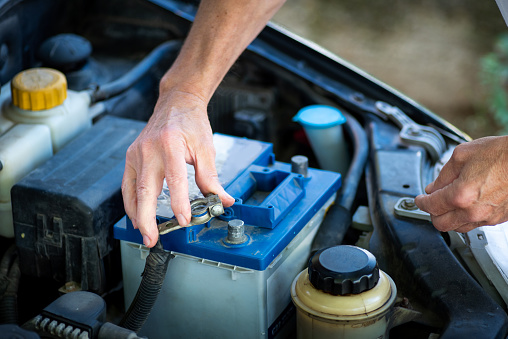October 1, 2024
How do I know if my car battery needs replacing?
There are several signs that can indicate that your car battery needs replacing. Here are some common ones:
- Slow engine crank: If you turn the key and the engine cranks slowly, it may indicate that your battery is weak and needs replacing.
- Dashboard warning light: Most modern cars have a battery warning light on the dashboard that will illuminate when there is a problem with the battery.
- Low battery fluid level: If your battery has removable caps, you can check the fluid level. If the fluid level is low, it could mean that the battery is not holding a charge.
- Swollen battery case: If you notice that the battery case is swollen or bloated, it may mean that the battery is overcharging and needs to be replaced.
- Age: Car batteries have a lifespan of around 3-5 years, depending on usage and maintenance. If your battery is getting close to this age range, it may be time to replace it, even if there are no visible signs of problems.
If you notice any of these signs, it is best to have your battery checked by a professional mechanic to determine if it needs to be replaced.
How many years does car battery last?
The lifespan of a car battery can vary depending on several factors, such as the make and model of the vehicle, the type of battery, and the conditions in which it is used. On average, a car battery can last between 3 to 5 years. However, with proper maintenance, some car batteries can last up to 7 years or more.
Factors that can affect the lifespan of a car battery include:
- Temperature: High temperatures can accelerate the chemical reaction inside the battery, leading to a shorter lifespan.
- Driving habits: Frequent short trips or long periods of inactivity can cause the battery to discharge and reduce its lifespan.
- Charging system: A malfunctioning alternator or charging system can overcharge or undercharge the battery, leading to premature failure.
- Battery quality: The quality of the battery can also affect its lifespan. Higher quality batteries may last longer than lower quality ones.
To maximize the lifespan of your car battery, it is recommended to have it checked regularly by a professional mechanic, especially if you notice any signs of battery failure such as slow engine cranking or a dashboard warning light. Additionally, keeping your battery clean and secure and avoiding frequent short trips can help prolong its lifespan.
How do I check the health of my car battery?
To check the health of your car battery, follow these steps:
1. Visual Inspection
- Corrosion Check: Look at the battery terminals for any signs of corrosion (white, ashy substance). Clean them using a brush and a solution of baking soda and water if needed.
- Cracks or Leaks: Inspect the battery case for cracks or leaks. Any physical damage suggests the battery should be replaced.
2. Check Battery Voltage with a Multimeter
- Set the Multimeter: Set the multimeter to DC voltage (V).
- Connect the Multimeter: Place the red probe on the positive terminal (+) and the black probe on the negative terminal (-).
- Read the Voltage:
- A fully charged car battery should read 12.6 volts or higher.
- If the voltage is between 12.4 and 12.6 volts, the battery is in good condition but slightly discharged.
- A reading below 12.4 volts means the battery is undercharged, and below 12 volts indicates a failing battery.
3. Perform a Load Test
- Use a Load Tester: A load tester applies a load to the battery to simulate the starting conditions of the car.
- How to Test: Connect the tester and follow the manufacturer’s instructions. A healthy battery should maintain a voltage above 9.6 volts while under load. If it drops below that, the battery may be weak or failing.
4. Test Battery with a Headlight Test (Quick Check)
- Turn On Headlights: With the car off, turn on your headlights for about 15 minutes.
- Check Brightness: If the lights dim significantly after a few minutes, the battery is likely weak.
5. Use an OBD-II Scanner
- Many modern cars have sensors that monitor battery health. An OBD-II scanner can check for battery-related error codes and performance data.
6. Check Battery Age
- If your battery is over 3-5 years old, it may be time for a replacement, even if it seems to work well.
Regular testing helps ensure your battery remains in good condition and prevents unexpected failures.
What shortens car battery life?
There are several factors that can shorten the lifespan of a car battery, including:
- Extreme temperatures: Exposure to high or low temperatures can damage the battery and shorten its lifespan. High temperatures can cause the electrolyte to evaporate and damage the internal components of the battery, while low temperatures can reduce the battery’s capacity and make it harder to start the engine.
- Lack of maintenance: Failure to properly maintain the battery can also shorten its lifespan. This includes failure to keep the battery clean, inspect the terminals for corrosion, and check the fluid level.
- Overcharging or undercharging: A malfunctioning alternator or charging system can overcharge or undercharge the battery, causing damage and reducing its lifespan.
- Short trips: Frequent short trips can prevent the battery from fully charging, leading to sulfation, which can damage the battery and reduce its lifespan.
To maximize the lifespan of your car battery, it is important to maintain it properly and avoid exposing it to extreme temperatures. Additionally, avoiding frequent short trips and having the battery and charging system checked regularly by a professional mechanic can help ensure that the battery lasts as long as possible.


